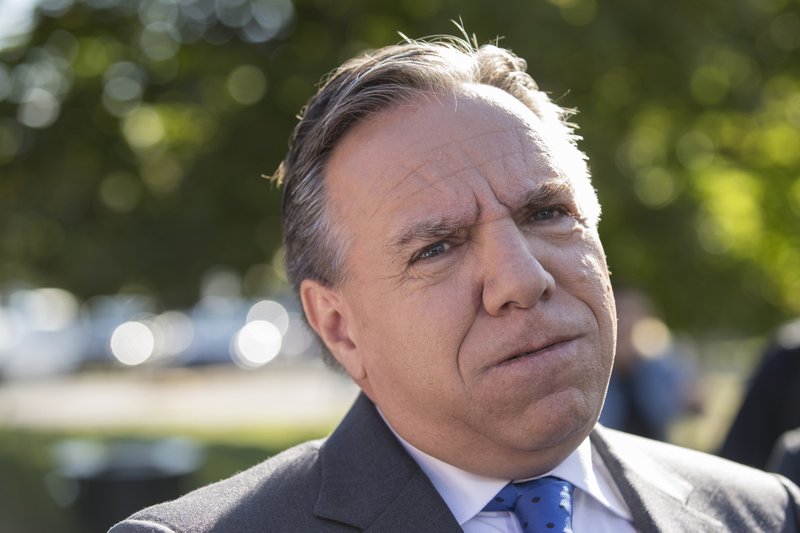TORONTO -- The new premier of French-speaking Quebec is forging ahead with a controversial plan to bar public servants in positions of authority from wearing religious symbols in the workplace, even as he faces accusations of employing a double standard for refusing to remove a crucifix from the provincial legislature.
The ban would prevent teachers, judges, prison guards and police officers from wearing religious garments such as hijabs, turbans or kippahs at work. The crucifix can stay up, the new government argues, because it is a historical symbol and not a religious one.
"We have a cross on our flag," said Premier Francois Legault, whose center-right Coalition Avenir Quebec party swept to power earlier this month, ousting the provincial Liberals who ruled for many of the past 15 years. He was speaking to reporters last week at a summit in Armenia. "I think that we have to understand our past. In our past, we had Protestants and Catholics. They built the values we have in Quebec. It's part of our history."
The ban highlights the complicated nature of managing religious symbols in Quebec, a once fiercely Catholic province that has for decades struggled with how to accommodate religious minorities, especially those from immigrant communities.
And it opens up a potential new point of conflict with Prime Minister Justin Trudeau, who opposes the plan, saying that he is "not of the opinion that the state should be able to tell a woman what she can wear, nor what she cannot wear."
Trudeau is not the only one panning the proposal. Thousands protested it -- and Legault's plans to slash immigration and expel all immigrants who fail French-language tests -- in Montreal last week. Jim Beis, the mayor of the Montreal borough of Pierrefonds-Roxboro, called the proposal "racist," adding that "no Quebecers should have to choose between their careers and their faith."
Many teachers' unions have also derided it, as has Jean Chretien, a former Liberal prime minister, who told The Canadian Press that the debate exploited fears about diversity and could lead to "ridiculous" outcomes.
In the wake of the criticism, the Coalition Avenir Quebec has slightly shifted its position. The party's transition spokesman told reporters this week that it would be open to the ban applying only to newly hired or appointed individuals but not those currently employed.
Still, legal experts believe the proposal violates constitutional protections of freedom of religion and will be the subject of a barrage of legal challenges, just like the late Liberal government's "religious neutrality law," a controversial piece of legislation passed last year that forbids anyone from receiving or providing a public service with his or her face covered.
If the measure is challenged in the courts, Legault said, he plans to invoke the "notwithstanding clause," a controversial and infrequently used constitutional power that allows provincial or federal governments to override judicial rulings and the constitution, to enforce the ban.
Quebec, unlike the rest of Canada, was dominated for decades by the Catholic Church, which ran the province's education and health care systems until anticlerical upheaval in the 1960s weakened its stranglehold over public and private life.
A Section on 10/20/2018
